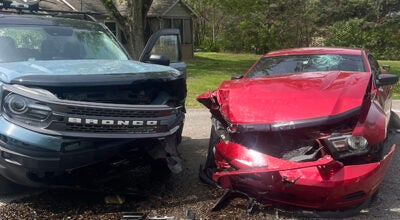Road commission manager makes pitch for millage
Published 7:56 pm Tuesday, January 24, 2012
Dowagiac City Council heard a presentation Monday night by Cass County Road Commission Manager Louis Csokasy on the one-mill, five-year proposal on the Feb. 28 ballot.
Approval would generate $1.8 million. The road commission would receive $1.6 million, with the remainder divvied up between the city and the 15 townships.
He estimated Dowagiac’s share at $90,000 annually. Road officials already charted what would be addressed in the first three years, 2013, 2014 and 2015.
While the road commission doesn’t maintain city streets, from Csokasy’s perspective, Dowagiac sits at the center of a four-township area of Silver Creek, Wayne, Pokagon and LaGrange where his agency will spend $1.7 million on primary roads in four years, 2009-2012.
Cass County has 269 miles of primary roads. Millage proponents are about a third of the way through 70 presentations to various groups.
Road triage
The road commission’s main funding source, the Michigan Transportation Fund, or MTF, continues to decrease while expenses — “about everything we do,” from asphalt to its 30-vehicle diesel fleet — “is tied to oil,” Csokasy said. “The other issue I’m concerned about with primary roads is that because our funding is not at a level where we can maintain all of our roads, we have to make choices, selecting those that have the highest usage,” such as Marcellus Highway and Dailey Road.
Csokasy said, “Some roads, because of their usage, we’re never going to get to. A road like Wilbur Hill. We’re going to lose that road in the near future, then, instead of spending $80,000 to blacktop, we’re going to spend $250,000 a mile digging it up. I’m a fiscal conservative, not a big tax guy, but I’d rather spend $80,000 than $250,000 in the near future. That’s what this is really all about.”
Many taxpayers assume property taxes help maintain roads. Not true.
“We pay for roads with a 19-cent-a-gallon gas tax,” Csokasy said. “That hasn’t changed since 1997. The other thing that happens is if you buy a new car, you buy one that’s more fuel efficient, so every year the amount collected goes down. Unfortunately, there are fewer people in Michigan and when gas goes to $4 a gallon, people drive less.”
Revenue peaked eight years ago in 2004, when it cost $40,000 a mile instead of $80,000. Last year, thanks to township cooperation, Cass County was able to pave more than 40 miles a road, or “as good as we’ve ever done. We ran about 55,000 tons of asphalt in our own plant,” Csokasy said. “Our revenue source, MTF, is down $500,000 since 2004 while our costs doubled.”
With a series of charts, he showed the 15- to 20-year life expectancy of a road.
That means if road crews start paving, it should take that amount of time to return to where they started to begin the process anew.
“Right now, it would take me 23 to 24 years to get back to this point,” Csokasy said. “In the last three years, we’ve sold $900,000 in non-performing assets, such as bits and chunks of land we owned all over the county and redeployed them,” including for a new salt storage shed.
Shrinking staff
Attrition in the past five years has seen office staff shrink to nine people — and Csokasy divides his time with St. Joseph County in Centreville. They’re quoting materials on a multi-county basis to save and finished “hard” labor negotiations, particularly the insurance co-pay plan “that over the life of the contract, our total labor costs will be lower than they are right now. We have working relationships with the city on our engineer and the St. Joseph County Sheriff’s Office rents part of our building. We’ve worked on relationships everywhere we could.”
Csokasy believes the solution resides in Cass County.
“The federal government is talking about cuts of 20 percent to 80 percent,” he said.
“Who knows what Washington will do? You’ll never hear me say the road commission is broke. We wish the state and the feds were in the shape we were. At the state level, there are no credible discussions on increasing overall road funding. There are some whispers coming out of Lansing, but I caution you if you think they’re marching to our help. They’re talking about infrastructure and changing Act 51 — how we get our funding. I hate to tell you that Cass is an agricultural county. My expectation is ultimately they’re going to increase taxes” and direct revenue toward busiest roads — places such as Wayne, Macomb and Oakland counties around Detroit.
Csokasy said for the median taxable value of a Cass County house, $45,306, the millage would cost $45.
The last proposal in 2008 lost, including among 400 of 600 voters in Dowagiac.
So far, one mile has been reverted to gravel, Csokasy said.
“We’ve delivered a list to every township averaging five to 10 miles so they stop investing in them. It’s not a threat, it’s just where we’re at,” with lightly-traveled arteries such as Savage Road, a primary which sees less than 100 vehicles a day.






